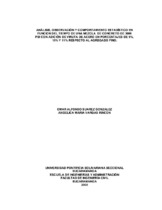| dc.contributor.advisor | Retamoso Llamas, Claudia Patricia | |
| dc.contributor.author | Súarez González, Omar Alfonso | |
| dc.contributor.author | Vargas Rincón, Angelica María | |
| dc.coverage.spatial | Seccional Bucaramanga. Universidad Pontificia Bolivariana. Escuela de Ingenierías. Facultad de Ingeniería Civil | spa |
| dc.coverage.temporal | 2008 | |
| dc.date.accessioned | 2013-07-03T16:42:52Z | |
| dc.date.available | 2013-07-03T16:42:52Z | |
| dc.date.created | 2008-11-28 | |
| dc.date.issued | 2013-07-03 | |
| dc.identifier.uri | http://hdl.handle.net/20.500.11912/364 | |
| dc.description | 102p.: (pdf); il; gráficas; tablas; anexos | spa |
| dc.description.abstract | Después de realizar el análisis, observación y comportamiento estadístico en función del tiempo de una mezcla de concreto de 3000 psi con adición de viruta de acero en porcentajes de 9%, 10% y 11% respecto al agregado fino, se obtuvieron datos que corroboran los resultados de investigaciones realizadas anteriormente, pues confirman como el porcentaje optimo de adición de viruta es de 10%, arrojando resultados de resistencia a la compresión óptimos, siendo en todos los casos los más significativos. Se tomaron muestras altamente representativas sobre los diferentes porcentajes de adición de viruta, para los cuales se ha considerado 120 cilindros para cada porcentaje. Los datos se obtuvieron realizando ensayos de laboratorio propios de los materiales componentes del concreto, que fueron caracterizados uno a uno, para desarrollar la mezcla de concreto optima y así poder analizar el comportamiento en el tiempo del concreto. El porcentaje de viruta adicionada se hace sobre el agregado fino, esta viruta previamente tamizada es incluida en la mezcla (0%-9%-10%-11%) luego de ello se preparan los moldes y es allí donde se conforman los cilindros. Las muestras son dejadas en un proceso de curado para cada porcentaje con las edades respectivas de 3-7-28-y 56 días. Al cumplir con este proceso de curado las muestras son falladas a compresión en el laboratorio y es entonces donde se procede al análisis estadístico sobre el comportamiento en el tiempo de las mismas. Este análisis demuestra a gran escala que este tipo de concretos tiene un comportamiento aceptable y que el 10% continua siendo un porcentaje favorable en cuanto a la resistencia.De igual manera los demás porcentajes son considerados también muy útiles ya que dependiendo de la aplicación que se requiera puede resultar un proceso económico y aplicable a los procesos constructivos. | spa |
| dc.description.abstract | After analyze, observation and statistical behavior in function of time of a 3000 psi concrete mixture with the addition of a steel shaving in percentages of 9%, 10% and 11% with respect to the fine aggregate, data recordings were obtained which corroborate the result of previous researches, thus the confirm how the optimum of steel shaving adding percentage it is 10%, giving optimum compression resistance as a result, being those the most significant in all cases. Highly significant samples were taken over the different steel adding percentages, for which 120 cylinders per each percentage were considered. The data was obtained by making proper laboratory essays of the materials that composing concrete, which were characterized one by one, in order to develop the optimum concrete mixture and so be able to analyze the behavior of concrete through time. The added steel shaving percentage is made over the fine aggregate, these shavings previously sifted is included within the mixture ( 0%, 9%, 10%, 11%), after that the molds are prepared and it is there where the cylinders take form. The samples are left to the cured process for each percentage with the respective ages of 3 - 7- 28 and 56 days. When this cured process is accomplished, the samples are failed by compression within the laboratory, and it is there, when the statistical analysis goes over the time behavior of the samples. This analysis shows in a great scale, that, this kind of concrete has an acceptable behavior and that 10% continues being a favorable percentage as far as it refers to resistance. In the same way, the other percentages are considered very useful, because depending of the required application it could be a cheap and applicable process the constructive processes. | spa |
| dc.language.iso | es | |
| dc.publisher | Universidad Pontificia Bolivariana | spa |
| dc.rights | Attribution-NonCommercial-NoDerivatives 4.0 International | * |
| dc.rights.uri | http://creativecommons.org/licenses/by-nc-nd/4.0/ | * |
| dc.subject | Ingeniería civil | spa |
| dc.subject | Tesis y disertaciones académicas | spa |
| dc.subject | Trabajos de grado ingeniería civil | spa |
| dc.subject | Viruta de acero | spa |
| dc.subject | Resistencia de materias | spa |
| dc.subject | Mezcla de concreto | spa |
| dc.title | Análisis, observación y comportamiento estadístico en función del tiempo de una mezcla de concreto de 3000 PSI con adición de viruta de acero en porcentajes de 9%, 10%, y 11% respecto al agregado fino | spa |
| dc.type | bacherlorThesis | spa |
| dc.rights.accessRights | openAccess | spa |
| dc.type.hasVersion | publishedVersion | spa |
| dc.identifier.instname | instname:Universidad Pontificia Bolivariana | spa |
| dc.identifier.reponame | reponame:Repositorio Institucional de la Universidad Pontificia Bolivariana | spa |
| dc.identifier.repourl | repourl:https://repository.unab.edu.co/ | |


